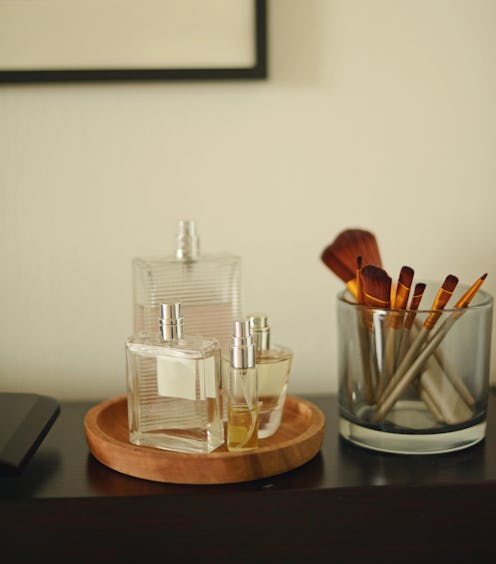(Beauty)
Here's The Real Reason Why Some Perfumes Are So Expensive
It's not all hype, and I found a few worth the price.

A signature fragrance can be just as important as a favorite piece of jewelry or that goes-with-anything pair of shoes. With that being said, there are many fragrances on the market that, along with their sweet scent, come with an investment-sized price tag. So why are some perfumes so expensive? As a fragrance fiend, I was curious too, which led me to connect with perfumer and cofounder of Fragrance With Benefits, Olivia Jan.
According to Jan, who studied at the prestigious ISIPCA perfume school in Versailles, to begin to understand why some scents are more expensive than others, you should think of fragrance as a recipe: Some ingredients are going to cost more than others.
"The role of the ingredients in a fragrance is the same as in a recipe," Jan explains. "For example, if you use fresh truffles or portobello mushrooms, your raw material cost will differ."
While unexpected, this produce comparison makes a ton of sense: Truffles typically start at $250 a pound, while portobello mushrooms usually max out about $6. Ingredients in fragrances similarly vary in cost.
And while synthetic ingredients don't always equal inexpensive in the case of fragrance, in many cases, natural ingredients are going to be more costly. For example, Jan notes that using a natural rose essential oil will be more expensive than a synthetic imitation. It’s all dependent on the time and labor that goes into obtaining the specific ingredient.
"If we take jasmine as an example, the harvest is tricky," Jan explains. "The flowers need to be handpicked, flower by flower, before the sunrise to keep the freshness of the fragrance. This very labor-intensive part makes this very precious and expensive."
Orris butter, a natural essential oil with a "violetty, powdery" aroma, is also a time-consuming ingredient to produce. "It takes about three years for the roots to grow [and] they need to dry for three more years,” notes Jan.
"After this lengthy process, the root is extracted with a low yield. This all together makes this ingredient more expensive than gold."
The amount of oil in a fragrance also matters (a lot). As Jan explains, the price of a fragrance is directly connected to the concentration of perfume oils. "The more you concentrate something, the more it will cost," she shares.
For example, an eau de cologne is the least concentrated perfume with about a five to eight percent concentration. Then there are the eau de toilettes that Jan says typically have a concentration of 10 to 14 percent. Lastly, we have the coveted eau de parfum, which Jan says is "the most precious extract” with a concentration of 18 to 22 percent.
6 Perfumes That Are Worth Their Price
In sweetly scented summary, a perfume’s ingredients, the time and labor that goes into production, and its concentration are all contributing factors to its overall cost. Looking at a fragrance’s concentration (is it eau de cologne or eau de parfum?) as well as the ingredients list can clue you into whether a bottle is worth its price.
Below, see six fragrances that are so worth it, thanks to their premium ingredients and formulation.
TZR Shop is The Zoe Report’s shoppable guide to editor-approved buys in fashion, beauty, wellness, and lifestyle. We may receive a portion of sales if you purchase a product through a link in this article.
TZR Shop brings you the editor-approved buys we can’t get enough of and think you’ll adore, too. Best of all, you can shop all of the products above directly on this page without visiting multiple retailers. Simply click on an item to learn more, choose your size or favorite color (if applicable), and then hit “add to cart.” When you’re done, you can click over to your cart in the top right corner of your screen to purchase all your stellar selects at once. How easy is that?
Questions about shipping, returns, or your order in general? Click here for more information.
Explore more of TZR Shop (and our fashion, beauty, and lifestyle must-haves) here.